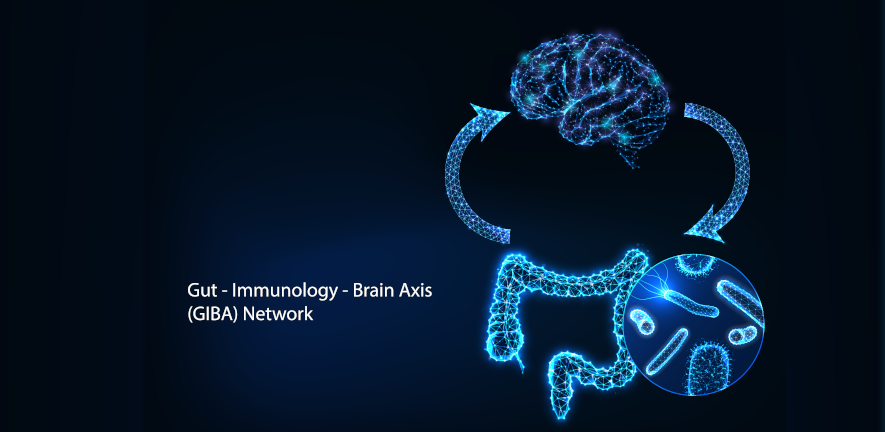
Submitted by Susana Camacho on Fri, 25/04/2025 - 16:39
A groundbreaking UK research network has been launched by UKRI to uncover how gut health influences the brain, immune system, and mental well-being – potentially leading to new treatments for conditions like anxiety, depression, and dementia.
The UK Gut-Immunology-Brain Axis Network+ is the first in the UK to unite experts from across research disciplines to investigate how lifestyle factors such as diet, sleep and stress influence the gut-immune-brain axis. This new initiative will be led by an interdisciplinary team of researchers, including Dr Alexandre Almeida (Department of Veterinary Medicine, University of Cambridge), Professor Jonathan Swann (University of Southampton), Professor Jessica Teeling (University of Southampton), Dr Aimee Parker (Quadram Institute) and Dr Franziska Denk (King’s College London). The project will run for four years and has received £4.5 million in funding from BBSRC.
A growing body of research suggests the gut, brain and immune system constantly communicate and play a critical role in mood, cognitive function, and chronic illness. But scientists don’t yet fully understand how. This network will bring together leading experts to find the missing biological links – laying the foundation for new therapies and practical lifestyle recommendations backed by science.
Dr Alex Almeida, Principal Investigator in the Department of Veterinary Medicine and Theme Lead in the Functional and Evolutionary Genomics Research Theme, said,
“It is becoming increasingly clear that to drive further understanding of the emerging area of the Gut-Immunology-Brain Axis we need to build strong interdisciplinary links across the UK. I look forward to contributing to the development of this UK-wide network by leveraging the existing strengths in Cambridge across areas such as bioinformatics, gut immunology and in vitro models.”
Why does this matter?
This matters because:
- mental health disorders affect one in four people, and gut health could be the next frontier in treatment
- dementia cases are rising, and scientists believe microorganisms living in the gut may influence brain ageing and function
- chronic conditions like obesity and diabetes are linked to gut health yet remain difficult to manage
Professor Anne Ferguson-Smith, Executive Chair of the Biotechnology and Biological Sciences Research Council (BBSRC), said:
“We now understand that the gut plays a far bigger role in physical, mental and cognitive health than previously thought. Understanding of interactions between biological systems is of major importance to our understanding of human health and disease.
This research network will help us uncover how the gut microbiome, immune responses, and brain function interact – leading to new, evidence-based strategies to improve well-being across all stages of life.”
Help us investigate untapped areas of research
Professor of Biomolecular Medicine Jonathan Swann from the University of Southampton said:
“The gut is often referred to as our second brain – and there’s growing evidence to suggest the health of our gut and the microbes that inhabit it can influence our mood and even our cognitive abilities.
The gut and brain are intimately connected, and we already know that intestinal distress can lead to serious illnesses like anxiety, stress or depression.
This new network will bring together expertise from across the UK to help us dive deeper into these diverse connections and help us investigate untapped areas of research such as the link between poor gut health and dementia in older age, the microbial role in infant brain development, and even their contribution to autism and ADHD.”
Key research areas
Recent studies have suggested that dietary interventions, such as increasing fibre intake or following a Mediterranean diet, can influence the gut microbiota and improve mood and cognitive performance.
- The network will build on these findings to identify precise biological mechanisms, ensuring that future treatments and lifestyle recommendations are based on robust scientific evidence.
- The network will focus on tackling major health challenges through:
- mental health solutions: investigating whether probiotics, diet and gut-targeted therapies could be effective treatments for anxiety and depression
- dementia and brain ageing: understanding how gut health influences neurodegeneration and whether simple lifestyle changes can help prevent Alzheimer’s disease
- chronic health conditions: exploring the gut’s role in immune function, inflammation, and diseases like diabetes and obesity
- artificial intelligence (AI) and big data: using advanced technology to analyse gut-brain interactions and accelerate discoveries
How the network will achieve this
To drive progress in these areas, the network will:
- encourage collaboration: connecting scientists, doctors, and industry partners to share knowledge and resources, speeding up discoveries
- develop better research methods: improving experimental models to make research findings more relevant to people
- use AI and big data: integrating large datasets and artificial intelligence to uncover key patterns and potential treatments more efficiently
- make testing easier: promoting less invasive, more accessible ways to study the gut-brain connection, making research more practical and cost-effective
- The findings from this research could lead to practical, evidence-based health advice that people can use in their daily lives. This might include choosing the right diet to boost mental resilience, identifying new therapies for brain-related disorders, or improving gut health to support overall wellbeing.
Find out more about Microbiome research at the University of Cambridge.
Adapted from a press release from UKRI: https://www.ukri.org/news/uk-research-network-to-unlock-gut-immune-and-brain-health-links/

